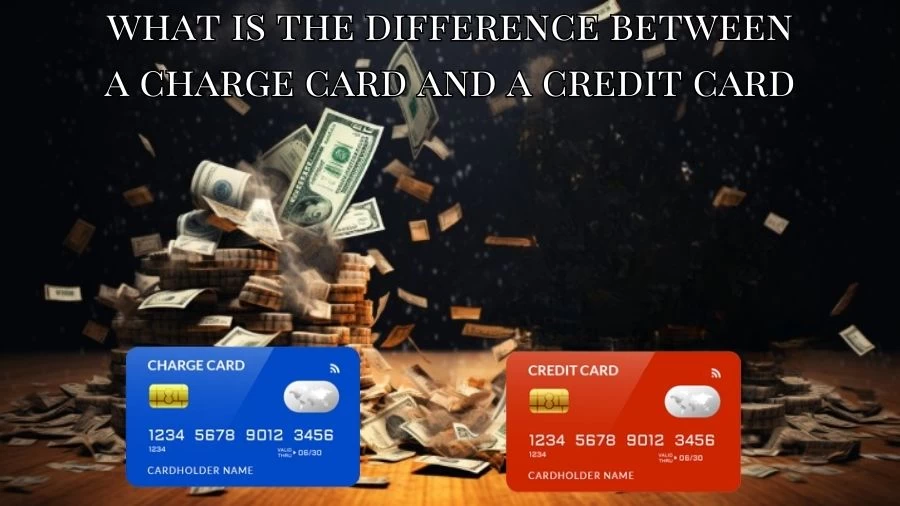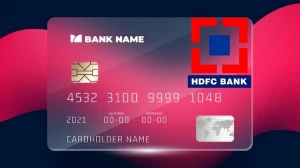
- Home »
- Credit Card »
- What is the Difference Between a Charge Card and a Credit Card? What is Charge Card?
What is the Difference Between a Charge Card and a Credit Card? What is Charge Card?
The key distinction between a charge card and a credit card lies in their payment mechanisms: charge cards require full monthly balance payment, while credit cards allow carrying over balances with interest charges, offering varying degrees of financial flexibility.
by Kowsalya
Published Aug 19, 2023 | Updated Aug 19, 2023 | 📖 11 min read
On This Page
- What is the Difference Between a Charge Card and a Credit Card?
- What is Charge Card?
- What is Credit Card?
- Charge Card Vs. Credit Card
- How Does a Charge Card Work?
- What is the Process for Obtaining a Charge Card?
- How to Pick Between Credit Cards and Charge Cards?
- What are the Advantages and Disadvantages of Charge Cards?
- How Do Charge Cards Affect Your Credit Score?
- Where Can I Obtain a Charge Card?
What is the Difference Between a Charge Card and a Credit Card?
While both charge cards and credit cards facilitate purchasing when cash is unavailable upfront, distinct differences exist between these card types:
- Monthly Payment Requirement: Charge cards necessitate full balance settlement monthly, with potential late fees and interest penalties for non-compliance. In contrast, traditional credit cards accumulate interest for carried balances, alongside late fees for missed due dates. Credit cards mandate a minimum monthly payment, often lower than the total balance.
- Availability: Charge cards are becoming increasingly rare, while conventional credit cards are widely accessible from various issuers, offering diverse reward structures, cash-back options, and fee arrangements. Moreover, specialized charge cards tailored for gas purchases are also available.
- Acceptance Rates: American Express asserts its cards are accepted by 99% of U.S. credit card vendors. However, international acceptance of American Express charge cards remains limited, often accompanied by foreign transaction fees. This contrasts with credit cards that don't impose fees for foreign purchases. Gas station charge cards might only find acceptance at co-branded fueling sites or within the card issuer's gas station network.
- Interest Charges: Charge cards mandate complete balance clearance each month, resulting in no interest accumulation or associated fees when used as intended. In contrast, credit cards accrue interest on carried balances not paid in full. This divergence underscores the key financial management principles of each card type.
What is Charge Card?
Utilizing a Charge Card for your business can offer strategic advantages, enabling significant purchases within an adaptable spending scope. Moreover, it facilitates effective cash flow administration by extending the payment window up to 54 days.
Unlike conventional credit cards, Charge Cards lack a predetermined spending cap for purchases. However, you are mandated to settle the entire card balance at the end of each billing cycle. Although no pre-set limits exist, it's important to note that unrestricted spending isn't permitted.
Instead, your purchasing capacity can expand progressively as your enterprise develops a positive track record of responsible expenditure and prompt payments. This approach encourages prudent financial management while fostering incremental growth in your business's financial capabilities.
What is Credit Card?
Credit Cards offer the flexibility of repaying your balance gradually, contributing to enhanced cash flow management for your business. With a Credit Card, your company operates within a predetermined spending threshold for each billing cycle.
Should the need arise, you have the option to seek an augmentation of this limit up to a designated level. This enables your business to adapt its financial scope to evolving requirements. Credit Cards provide the choice of settling the entire balance within each billing period or retaining a balance and incurring interest fees. This versatility allows you to align your payment strategy with your business's financial circumstances, fostering effective financial planning and accommodating varying operational needs.
Charge Card Vs. Credit Card
Charge cards and credit cards are both payment instruments that enable individuals and businesses to make purchases and manage their finances. However, they possess distinct characteristics and implications:
- Spending Limit and Flexibility:
- Charge Card: Charge cards do not come with a preset spending limit. This offers greater flexibility, allowing access to varying buying power without a fixed cap. Yet, this doesn't equate to unlimited spending; the issuer must approve larger transactions.
- Credit Card: Credit cards provide a fixed spending limit. Users can spend up to this limit, but exceeding it may lead to declined transactions. The limit can be increased over time, subject to issuer approval.
- Monthly Payments:
- Charge Card: With a charge card, the full balance must be paid each billing period, usually monthly. There is no option to carry over balances, eliminating interest charges but necessitating full repayment.
- Credit Card: Credit cards offer the choice to pay the full balance or make a minimum payment. Carrying a balance leads to interest charges on the unpaid amount.
- Credit Utilization and Credit Scores:
- Charge Card: Recent FICO® Scores generally do not factor charge card balances into credit utilization calculations. This means these balances might not significantly impact your credit score.
- Credit Card: Balances on credit cards influence credit utilization, a critical factor in credit scoring. High utilization can negatively affect credit scores.
- Acceptance and Usage:
- Charge Card: Charge cards like American Express might have slightly lower acceptance rates compared to traditional credit cards, especially internationally.
- Credit Card: Traditional credit cards, from various issuers, offer broader acceptance and are more versatile for a wide range of purchases.
- Credit History and Eligibility:
- Charge Card: Charge cards often necessitate a good-to-excellent credit score due to the lack of preset limits and the expectation of full payment. Limited or poor credit may lead to rejection.
- Credit Card: Credit cards cater to a wider range of credit scores, including those with limited or imperfect credit histories.
Ultimately, the choice between a charge card and a credit card should be based on individual financial habits, spending patterns, and credit goals. While charge cards offer flexibility and financial discipline, credit cards provide more spending options and can assist in building or rebuilding credit.
How Does a Charge Card Work?
In contrast to a credit card, a charge card provides a more flexible spending approach by not having a predefined spending limit. This adaptability is particularly useful as it accommodates varying monthly expenditure needs, allowing access to necessary purchasing power even during fluctuations.
However, this doesn't imply limitless spending freedom. Prior to making substantial purchases, it's advisable to communicate with the issuer to seek approval for the desired transaction amount. This fosters responsible spending, as charge cardholders are aware of the impending obligation to repay the debt within a relatively short timeframe.
On the other hand, a credit card offers greater spending latitude. While it features a fixed borrowing limit, only a minimum monthly payment is obligatory for the outstanding balance. Despite the allure of smaller monthly payments, interest accrues over time, contributing to the overall financial burden. To mitigate this, paying off the full credit card balance monthly is advantageous.
For those requiring extended repayment windows, a credit card might be preferable. Utilizing a card with an introductory 0% APR offer for purchases grants a temporary period without interest charges, which usually spans from six months to almost two years. Such leniency is seldom available with charge cards, making credit cards a suitable choice for individuals seeking prolonged repayment options while managing costs effectively.
What is the Process for Obtaining a Charge Card?
While credit cards are accessible to individuals with varying credit histories, a charge card usually necessitates a good-to-excellent credit score. This is due to the higher risk assumed by the issuer, as they anticipate you'll pay your entire bill monthly without a preset spending limit. For those with limited or poor credit history, a secured card might be a better choice.
American Express remains the primary issuer that offers cards resembling traditional charge cards. The available options for consumers encompass:
- The American Express® Green Card
- The American Express® Gold Card
- The Platinum Card® from American Express
These products share similarities with charge cards, with the added feature of "Pay Over Time" available to select cardholders. This feature treats eligible purchases like those on a credit card, allowing them to carry balances up to the Pay Over Time Limit, incurring interest charges*.
Outside of American Express, a few retailers (especially gasoline chains) might provide charge cards solely usable within their brand, although most allow balance carryover. If you're eligible for a small business card, options like the Capital One Spark Cash Plus* also exist.
How to Pick Between Credit Cards and Charge Cards?
Maintaining the practice of fully paying off your card balances each month is strongly recommended. When you do so, the differences between charge cards and credit cards become less significant; the primary contrast lies in the potential for greater spending capacity with a charge card. Therefore, it's essential to assess the cards based on their features.
Given equivalent conditions, the majority of individuals are better suited to opt for credit cards. These cards offer increased options and versatility compared to charge cards, both during the selection process and their usage. Moreover, you can easily emulate the usage of a charge card with a credit card by settling your balance entirely.
However, if your requirements involve a card for substantial spending volumes, coupled with consistent balance repayment and the benefit of inherent travel privileges, a charge card might be a fitting choice for your needs.
What are the Advantages and Disadvantages of Charge Cards?
Charge cards come with distinct advantages and disadvantages that should be carefully considered before deciding to use one:
Advantages of Charge Cards:
- No Pre-set Spending Limit: Unlike credit cards, charge cards don't have a fixed spending limit. This can provide greater flexibility for larger purchases and unexpected expenses.
- No Interest Charges: Since charge card users are required to pay off their balance in full each month, there are no interest charges accrued on carried-over balances.
- Build Responsible Financial Habits: Charge cards encourage responsible financial behavior by mandating full balance payments, preventing the accumulation of long-term debt.
- Rewards and Benefits: Charge cards often come with premium rewards programs, offering exclusive perks such as travel benefits, airport lounge access, and cash back.
Disadvantages of Charge Cards:
- Mandatory Full Payment: The biggest drawback of charge cards is the requirement to pay the full balance every month. Failing to do so can result in late fees, penalties, and potential damage to your credit score.
- Limited Borrowing Flexibility: Charge cards don't provide the option to carry over a balance, making them less suitable for situations where you need to spread out payments over time.
- Annual Fees: Many charge cards come with higher annual fees compared to regular credit cards. These fees can offset the value of rewards and benefits for some users.
- Limited Acceptance: Charge cards, especially those from certain issuers, might have more limited acceptance internationally and at certain merchants compared to widely accepted credit cards.
- Stringent Approval Criteria: Charge cards typically require a higher credit score and better financial history for approval, making them less accessible to individuals with lower credit scores.
How Do Charge Cards Affect Your Credit Score?
Traditional credit cards operate on a revolving credit model, allowing you to carry a balance from one month to the next. The credit limit assigned to your card influences your credit score, particularly your credit utilization rate—the ratio of your card balance to your credit limit. If you use a significant portion of your credit limit, it can potentially lower your credit score.
In contrast, charge cards don't come with fixed credit limits. The latest FICO® Scores☉ don't consider charge card balances when calculating your credit utilization. However, older FICO® Score versions and VantageScore® calculations might include charge card balances in determining your credit score.
Essentially, this implies that the impact of charge card balances on your credit score might be less significant. As a responsible charge card user, you can enjoy the advantages of maintaining a positive payment history without the potential downside of a balance affecting your credit report.
Choosing between a traditional credit card and a charge card should be based on your financial habits, spending needs, and credit goals, taking into account the potential implications for your credit score and overall financial situation.
Where Can I Obtain a Charge Card?
When it comes to charge cards, the selection available is comparatively narrow. One of the predominant credit card providers that continues to offer a significant range of charge card options for both individual consumers and businesses is American Express.
Additionally, companies managing fleets of corporate vehicles can explore gas cards that function similarly to charge cards. With these gas cards, businesses can cover fuel expenses for their fleet using the card, typically at designated fueling locations affiliated with the card issuer. Subsequently, the outstanding balance must be paid in full each billing cycle. Some of the notable issuers of fleet cards encompass WEX, Sunoco, Shell, and other established brands.
When making a decision between charge cards and other types of payment solutions, factors such as your specific business requirements, payment preferences, and financial objectives should be taken into account.
What is the Difference Between a Charge Card and a Credit Card-FAQs
1. What is a charge card?
A charge card is a payment tool that allows you to make purchases without a preset spending limit. However, you're required to pay off the entire balance each billing cycle.
2. How does a credit card differ from a charge card?
A credit card also enables purchases, but it comes with a fixed credit limit. You can choose to pay the full balance or make minimum payments and carry over a balance, which may incur interest charges.
3. Do charge cards impact credit scores?
Recent FICO® Scores generally exclude charge card balances from credit utilization calculations, so they have a minor effect on credit scores.
4. Which card is more suitable for me?
If you're financially disciplined and aim to pay in full each month, a charge card can offer flexibility without interest charges
5. Can I use a charge card for large purchases?
While charge cards lack preset limits, it's recommended to contact the issuer for approval before making significant purchases.




